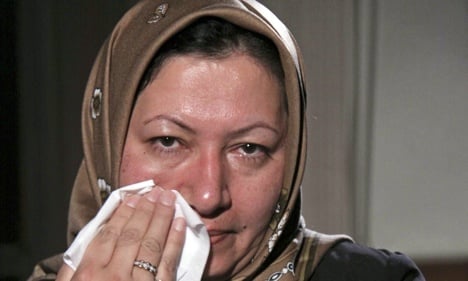“I think she is being subjected to enormous pressure by the Islamic regime and has said that under pressure,” said Mina Ahadi, an anti-stoning activist based in Germany who warned in November of the imminent execution of Sakineh Mohammadi Ashtiani.
Ashtiani, a 43-year-old mother of two, appeared in front of foreign media and judiciary officials on Saturday and said she has told her son to sue two German reporters who had interviewed him about her case.
“I have told Sajjad… to sue the ones who have disgraced me and the country,” she said in the northwestern city of Tabriz where her trial took place.
Ashtiani named those she wants to sue as “the two Germans,” her former lawyer Mohammad Mostafaie, her husband’s convicted murderer Issa Taheri and Ahadi.
“I have a complaint against them,” she told Iran-based foreign media at an appearance organised by judiciary officials at a government welfare organization guesthouse in Tabriz.
The two German journalists from Bild am Sonntag were arrested on October 10 in Tabriz for interviewing Ashtiani’s son and family lawyer who were also taken into custody. The son was released last month.
Iran says the two Germans entered the country on tourist visas and failed to obtain the necessary accreditation for journalists from the authorities before “posing as reporters” when they contacted Mohammadi Ashtiani’s family.
Ahadi, who reportedly arranged for the Germans to meet Mohammadi Ashtiani’s son, told news agency AFP that she was “pleased that our operations against stoning are annoying the regime.”
The deputy editor of Bild am Sonntag said he was “surprised and amazed” at Ashtiani’s remarks about its reporters.
“We find it surprising that a woman sentenced to death in Iran could leave prison for a few hours to announce to the Western media that she wants charges against the journalists reporting on her case,” Michael Backhaus said.
Ashtiani was sentenced to death by two different courts in Tabriz in separate trials in 2006.
Her sentence to hang for her involvement in the murder of her husband was commuted to a 10-year jail term by an appeals court in 2007.
But a second sentence to death by stoning on charges of adultery levelled over several relationships, notably with the man convicted of her husband’s murder, was upheld by another appeals court the same year.
Ashtiani, who was joined by her children on Saturday when she spoke to the media, did not make any plea for clemency, but her son Sajjad Ghaderzadeh pleaded for her execution to be stayed.
A hundred prominent Germans, including business leaders, ministers and top sports stars, on Sunday urged Iran to free the journalists.
“The pair must be released and must return to Germany as soon as possible,”
said Foreign Minister Guido Westerwelle, told the Bild am Sonntag, who published the appeal.
“A state like Iran, which always calls for understanding, must not flout it in other areas,” added Defence Minister Karl-Theodor zu Guttenberg.
Other signatories included the heads of Deutsche Bank, Deutsche Telekom and BMW, footballer Philipp Lahm, Formula One star and seven-time former world champion Michael Schumacher and Nobel literature laureate Herta Mueller.
AFP/bk




 Please whitelist us to continue reading.
Please whitelist us to continue reading.
Member comments